Introduction
Businesses play a greater role in our lives than just providing material resources. The product and services which come from these businesses are present in every aspect of human existence. As businesses now have a very strong influence on us, there is a need to look at the moral issues related to businesses (Malachowski, 2001).
Business ethics might not be vital for any business but ethical values do play an important role in the corporate world. The decisions taken by any business affects its customers, stake holders, its market value and even the thought process of the people associated with that business. Therefore, today businesses are expected to meet the ethical standards of the corporate world.
What is ethics?
The term ethics commonly refers to the rules or principles that define right and wrong conduct.
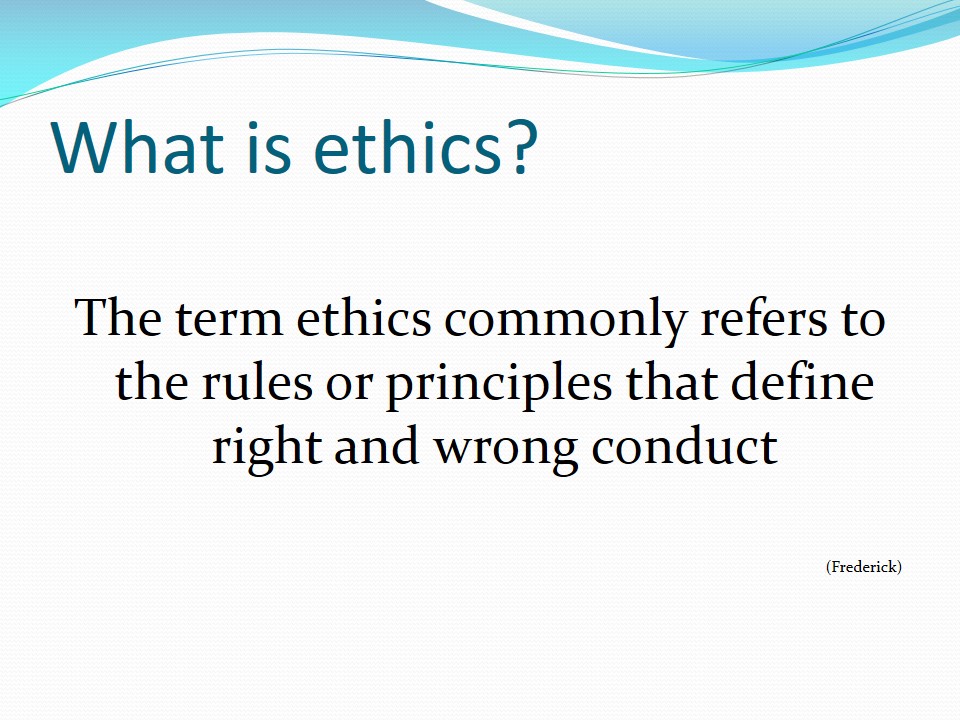
What is business ethics?
Business ethics deals with the ethical norms and issues related to ethics in the business world. In today’s world people are more concerned about how the management conducts the business rather than what business they do. Business ethics is basically how a business conducts its day to day dealings while adhering to the ethical standards. These ethical standards are unwritten rules which organizations follow in order to keep a good image for themselves in the market and also due to the reason that ‘it is the right way’.
People believe that businesses are only interested in money and will stoop down to any level as long as their action is legal and generates money. People also believe that the business world is suffering from an ethical crisis these days. There are many things such as misinterpretation of data, covering up mistakes or blaming mistakes on others, lying etc which have all become acceptable in the corporate world. All of these things are considered to be necessary elements of any business if it has to survive in the corporate world. It is true that all these things which were unacceptable in the business world have become acceptable. Management leaks out insider stock information to people, covering up of profits in order to pay lesser tax is another example and even the college students have different perception and views about the ethical rightness of anything.
In a survey conducted at the Rutgers University, it was found that almost 53% of the post graduate students had cheated in their exams. Almost 37% of these students believed that it was perfectly okay to do something wrong (cheating etc), if it did not break any laws, rules or regulations (Ferell & Fraedrich, 1994; Tetzeli, 1991).
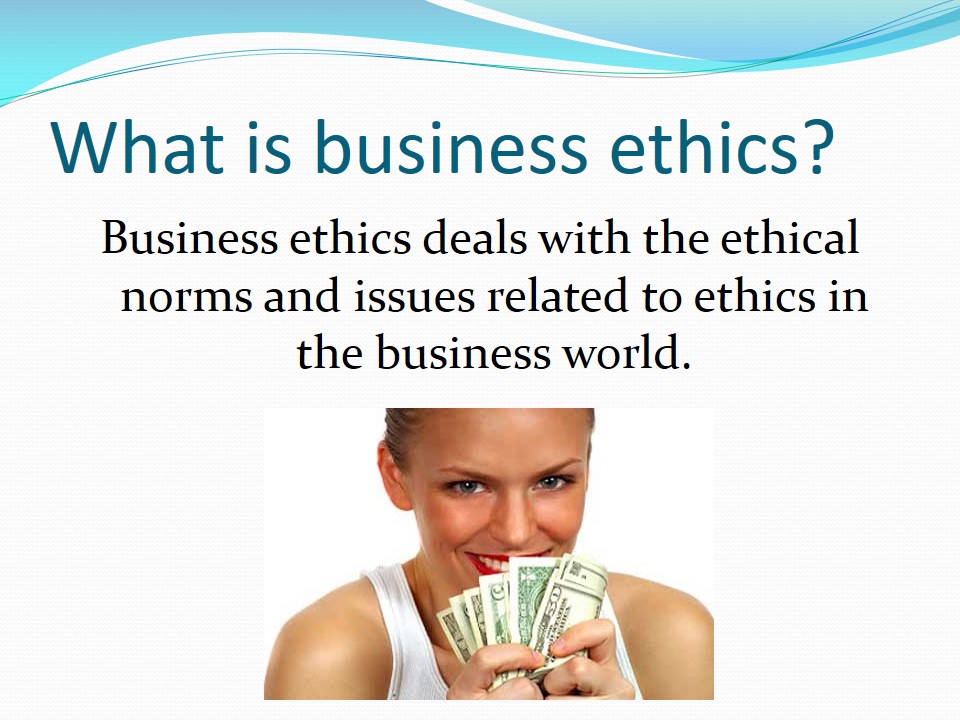
Different views of business ethics
There are almost four different views of business ethics. Each of these views is discussed below:
- Utilitarian view of ethics.
- Rights view of ethics.
- Theory of justice view of ethics.
- Integrative social contracts theory.
Utilitarian view of ethics
In this view of ethics the decisions are made according to the outcome or the result of the action taken. Whatever the action is, if the results are good and are beneficial for the majority, then such kind of decision is acceptable and ethical according to the utilitarian point of view. For example; if in an organization the management decides to layoff almost 20% of the workforce, then the management can justify this action as ethical according to the utilitarian point of view. Management can justify by saying that this layoff increases the profitability of the organization. Moreover, this also ensures the safety of the rest of the 80% employees who are still working there. It is also beneficial for the stakeholders too. Therefore, it can be seen though this decision of the management was not good for the 20% who got fired, however was beneficial for the organization itself and hence it can be justified. As it can be seen that the utilitarian view of ethics considers a decision right if the results are not ethically wrong.
Rights view of ethics
This kind of view is concerned with the individual rights of a person. The decision or action is considered to be morally right if it does not hinder the individual rights, such as; freedom of speech, freedom of conscience, privacy etc. for example; if the employer of any organization is not following the rules, then the employees of such organization can complain against their employers and they will have to take action as they believe in the right of free speech. The management can not condemn this if they believe in the rights view of ethics. Even though this is considered to be a good approach, but sometimes it can hinder in the way of achieving targets. For example; if there is a lot of individual right and freedom environment generated in the organization, then lesser work will be done and the productivity will also be low. People will be worried about protecting their rights rather than getting the job done.
Theory of justice view of ethics
This view of business ethics depends on the mangers individual decision making ability. For example; if a manager hires a new employee and decides to pay him more than the minimum wage as he believes that it is not possible to live decently with just minimum wage. This kind of justice view of ethics can help the relatively weak stakeholders but on the other hand can restrict the creative thinking and risk taking ability of an individual. Employees tend to reduce risk and take a safe approach in everything.
Integrative social contracts theory
This view of ethics is totally different from the three other views of ethics. It believes in two important approaches which are combined in order to form the integrative social contracts theory. The empirical approach which addresses the question of “what is?” and the normative theory which addresses the question of “what should be?” are combined together. In this theory the normal social responsibilities and ethics of behavior are also kept in mind and moreover, the specific business rules are also studied. This kind of business ethics is different from the rest of the three as this view studies the existing norms and cultural ethics of the business world before taking any action or decision.
According to many researchers, the utilitarian view of ethics is the one mostly used in the business world. (Fritzsche & Becker, n.d). The reason for this acceptance is the ability of this view to be more profitable and productivity oriented than any other approach.
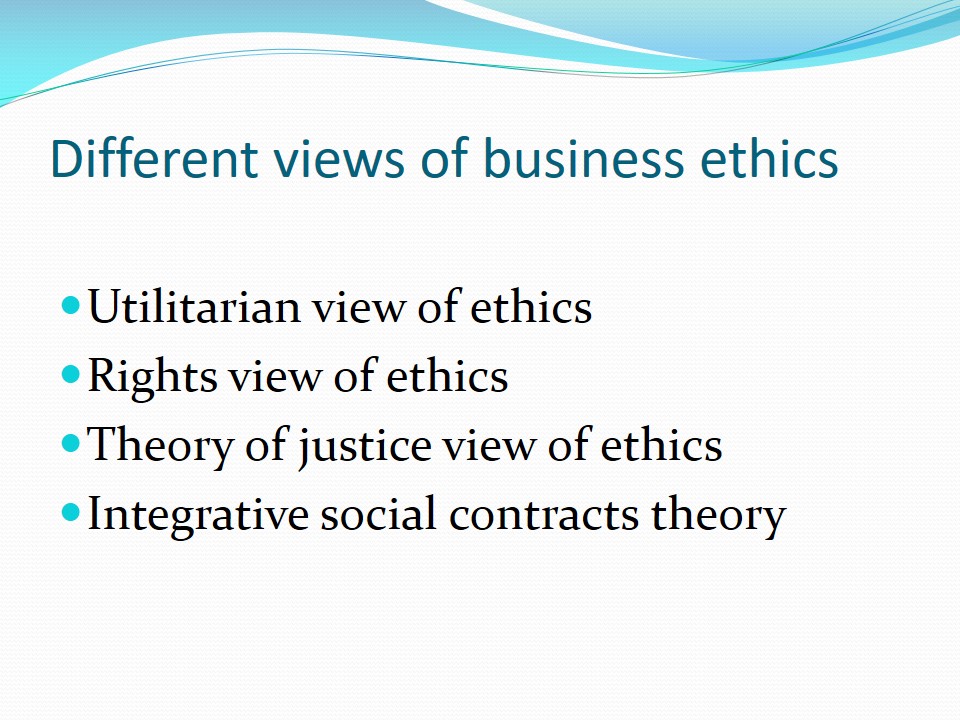
Factors affecting business ethics
- Moral development of an individual.
- Individual characteristics.
- Structural variables.
- Organizational culture.
- Issue intensity.
Businesses are highly dependent on the people taking decisions in the organizations i.e. managers. Hence business ethics are also dependent on the way the managers think. On the other hand the ethical decisions of managers depend on various things such as individual characteristics, organizational design and culture, kind and intensity of the ethical issue etc, (Dumaine, n.d) which can influence the thought process of an individual. Even a person of high morals can do wrong things if factors such as organizational culture and policies etc have a negative effect or a relatively lenient hold, on the other hand a person who lacks a strong moral sense can do right things if proper organizational policies etc are implemented. Hence, there are various factors which can affect the ethics of business. Below are some of the factors which can affect the business ethics indirectly and the ethical perception of managers directly.
Moral development of an individual
According to Kohlberg, there are three levels of moral development. Each of these three levels consists of further two stages. The important thing to note is that, as the individual progresses through each stage, he becomes less and less dependent on the environmental factors which can influence his decisions and more dependent on his ability to differentiate between right and wrong. (Kohlberg (a), n.d).
The first level or stage is known as the pre-conventional stage. In this stage the individual makes the decision depending on the influences such as punishments or rewards. In the first sub stage of this level the individual makes the decision to avoid any kind of physical punishment. In the second sub level of this stage the person does not take ethical decision to avoid physical punishment but takes these decisions if it his own benefits are involved.
The second stage is known as the conventional stage. In the first sub-level of this stage the individual makes the ethical decision merely to please others. Hence, the ability of the person to differentiate between right and wrong depends on the expectations of people close to him. In the second sub-level of the conventional stage, the person makes an ethical decision to adhere to the rules. The person might already have agreed to these regulations and therefore makes his decision based on these obligations.
The third stage of the moral development is the principled stage. In the first sub-level of this stage the person makes an ethical decision depending on how it will affect the others. The rights of others and their dependence on this decision affect the individual’s decision making ability. The next stage, in which the moral development is at its peak, is independent of any external factors. In this none of the external factors affect the ethical decision making ability of the individual and the clear differentiation between right and wrong helps the person to make the right decision (Kohlberg (b), n.d).
Individual characteristics
When a person enters an organization he has already developed a set of values to which he will adhere. These values are built up during his childhood and youth with the help of friends, family etc influences. These values affect the manager’s ability to differentiate between rights and wrong hence every individual has his own personal values. (Barnett & Karson, n.d; Frederick & James, 1990).
It has been noted that there are two individual characteristics which affect this ethical decision making ability of the person, the most. The first characteristic is ego strength. People who have high ego strengths follow the decision through the right and wrong ability and are rarely influenced by impulses. On the other hand people with low ego strength usually fall for external factors which can affect the decision making ability of that individual.
Locus of control is another important characteristic of a person which can affect his ethical decisions. People who have inner locus of control believe that they are the ones responsible for every decision they take and are also responsible for their own destiny. On the other hand people with an external locus of control believe that whatever happens to them is fate and they cannot change it. It is merely because they did not get the opportunity to do otherwise. Such people always blame their fate for everything and are less likely to accept their mistakes. Researchers have pointed out that these people are more likely to get influenced by external factors which can change their ethical decisions. On the other hand people who believe that they are responsible for every decision they take have strong personalities and are less likely to take any wrong decision merely due to external factors.
Structural variables
The structure, rules and regulations etc also have an influence on the decision making ability of a manager. If businesses have lenient and ambiguous rules, then it is more likely that unethical activities will be prevalent in such organizations. On the other hand business ethics can be improved by merely improving the structure of the ethical values in the corporate world. Unambiguous job descriptions and well explained rules and regulations reduce the chances of unethical activities in the business world. On the other hand a supervisor also plays an important role in the decision making abilities of the employees. (Posnor & Schmidt, n.d). the reason for this is that if employees make a mistake they seek for the supervisor who they can benchmark themselves against and next time they can deliberately conduct that unethical activity or take that unethical decision merely due to the fact that ‘the boss does it too’.
Organizational culture
The organization culture also plays an important role in the ethics of the business world. Depending on the tolerance level of that organizational culture, the acceptance levels of any unethical behavior can be defined. Moreover, a strong organizational culture tends to mould the personalities and thought process of the managers and hence shaping their decision making ability. A strong culture has more influence eon the managers than a weaker one. The managers of a strong organizational culture tend to be more ethical than the ones with a weaker culture. For example in 1982 and 1986, when Johnson & Johnsons found out that they had tampered products on their stores all over the country, before even a statement or an order was issued, the managers of J&J had already removed those products from the shelf. The strong culture of J&J had influenced the ethical decision of the managers.
Issue intensity
An individual might easily take a few office supplies to his home and might not even considering tampering with the company’s funds even if they are in his hands. This shows that the intensity of the ethical issue also has an influence on the decision making ability of the individual. In other words, how great the harm is or how bigger the affect will be affects the solution of the ethical problem. It is believed that if more number of people is affected by that act, then such an act is more evil as compared to the one where only a few people get affected.
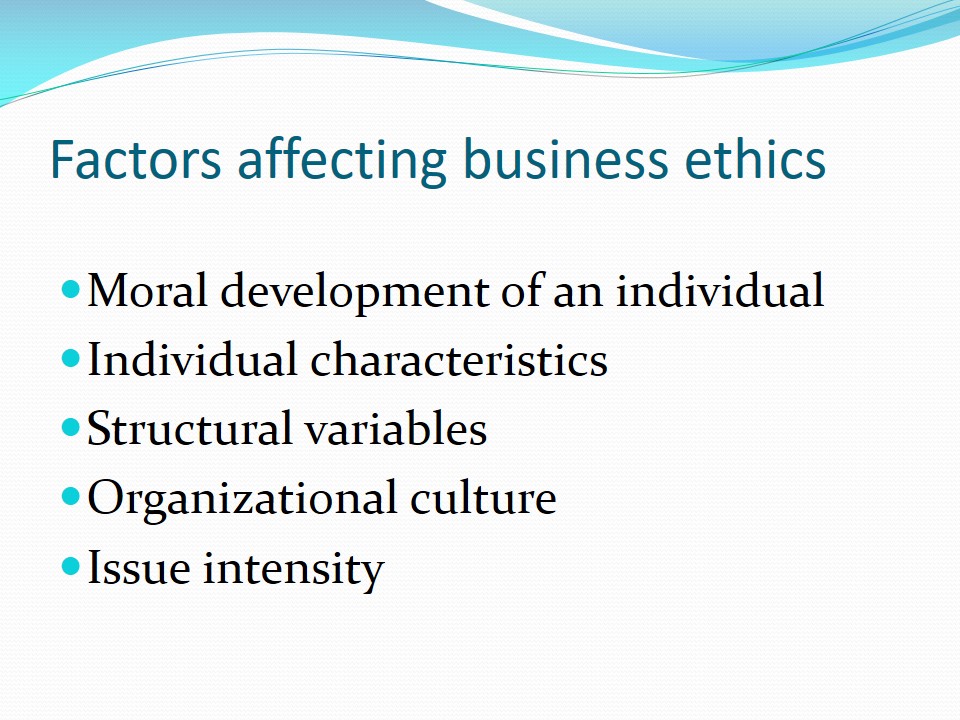
The role of top management?
- Top management is the role model or benchmark.
- Employees tend to copy and quote the top managers.
- Management taking unethical decisions tend to influence employees to take such decisions too.
There are many things the top management can do in order to reduce the number of unethical acts in the organization. The management can set strict rules and regulations, establish code of ethics and provide training for making ethical decisions. If all these activities are taken individually they might not have a very high intensity impact. However, on the other hand group activities have a great influence on the ability of an individual to change himself.
As all individuals belong to different backgrounds and moral development levels, therefore it is the duty of the management to select them and place them in different groups. Comprehensive ethical programs should be developed in order to help the employees’ moral development.
The best way however would be to develop a proper code of ethics. This is a formal document of an organization which explains the values and ethical rules of the company. The employees are expected to follow these rules. Putting forward a code of ethics provides a benchmark which has to be followed. This benchmark not only helps them to improve their ethical standards but also helps them avoid any wrong decisions or unethical acts.
Top management is the role model of an organization. Employees tend to follow the top management team and quote them wherever they could. Management should make careful decisions of who gets promoted and who gets a raise. These decisions send a very strong message to whole of the organization. A person who is unethical gets a raise, means that all employees can do the same and will be appreciated.
Unrealistic goals tempt the employees to take a short cut or find an unethical means to get their job done. The goals set by the organization should be tangible and achievable. Proper workshops should be developed in order to let the employees change their mindset about business ethics. Moreover, independent audits should be carried out which can help the top management define each employees ethical standard.
The main aim of the management should be to raise the ethical standards of the organization. Punishing or firing the employees would only create a negative environment. On the other hand proper performance appraisal and ethical workshops will help the employees understand the ethical world of business.
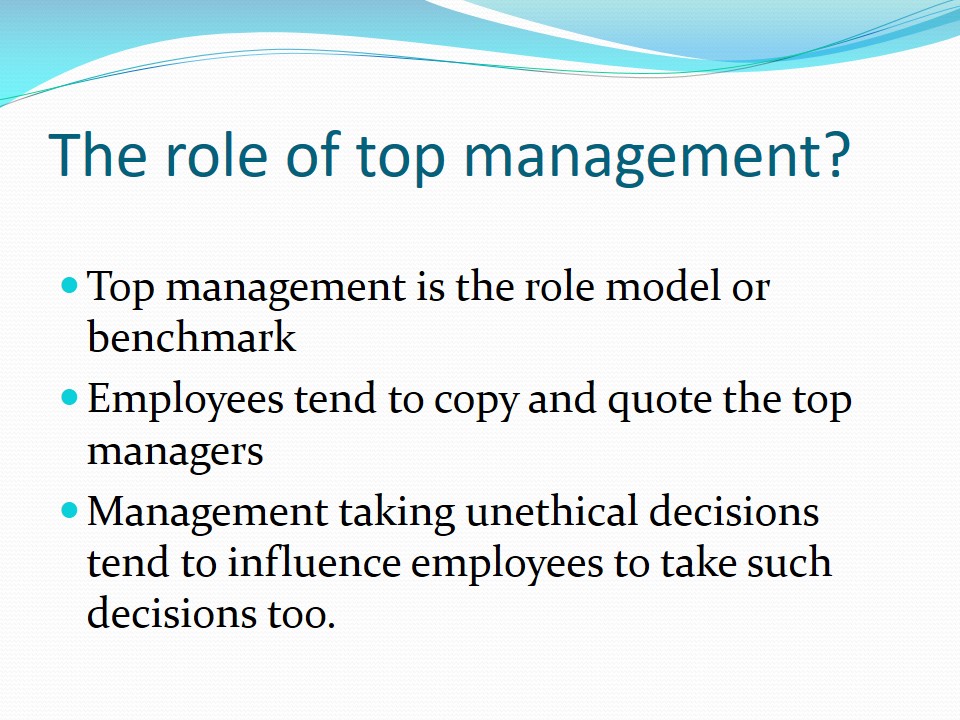
Workshops and comprehensive ethical programs
Individual workshops tend to affect less than group programs.
- Comprehensive programs should be developed to change the thought process of the employees.
- Employees should be able to take decisions according to the code of ethics.
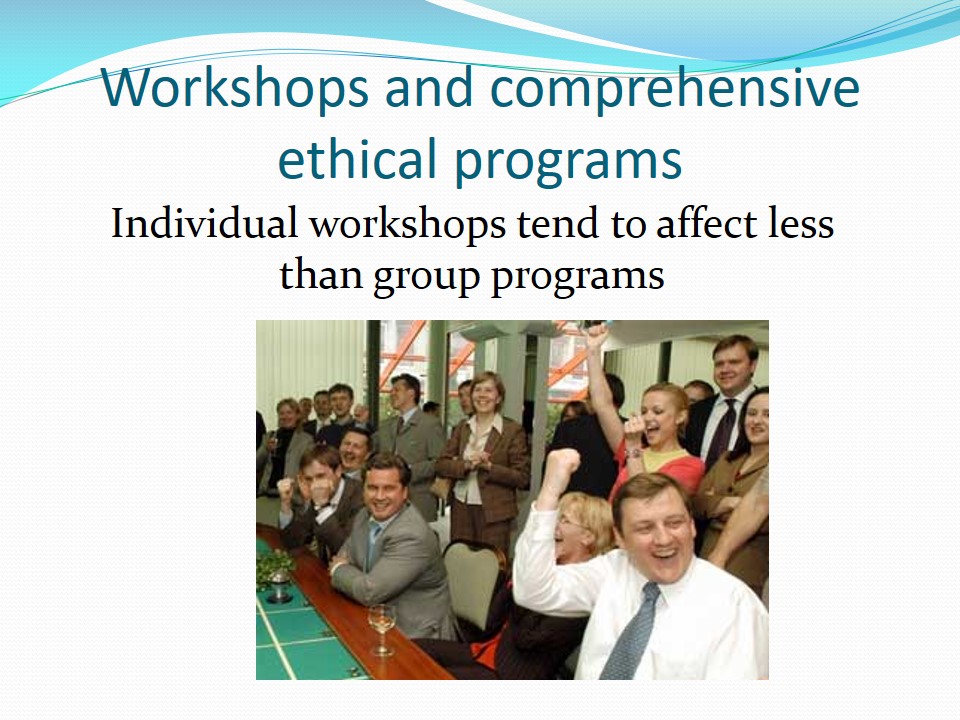
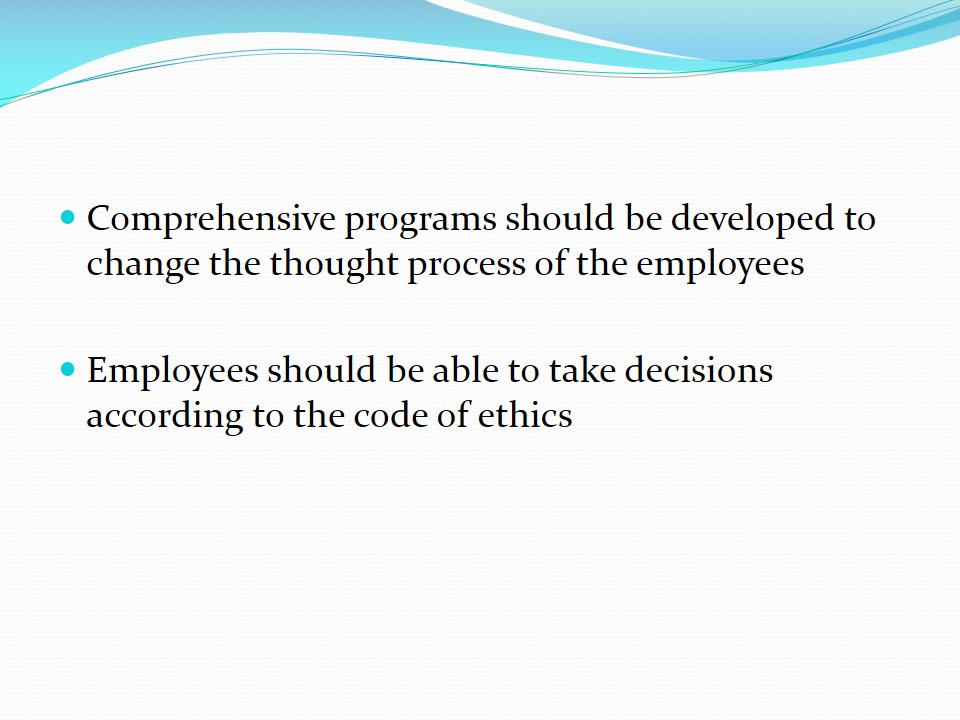
Code of Ethics
- This is the most important part of the change process.
- An unambiguous, clear and concise code of ethics should be a part of every organization.
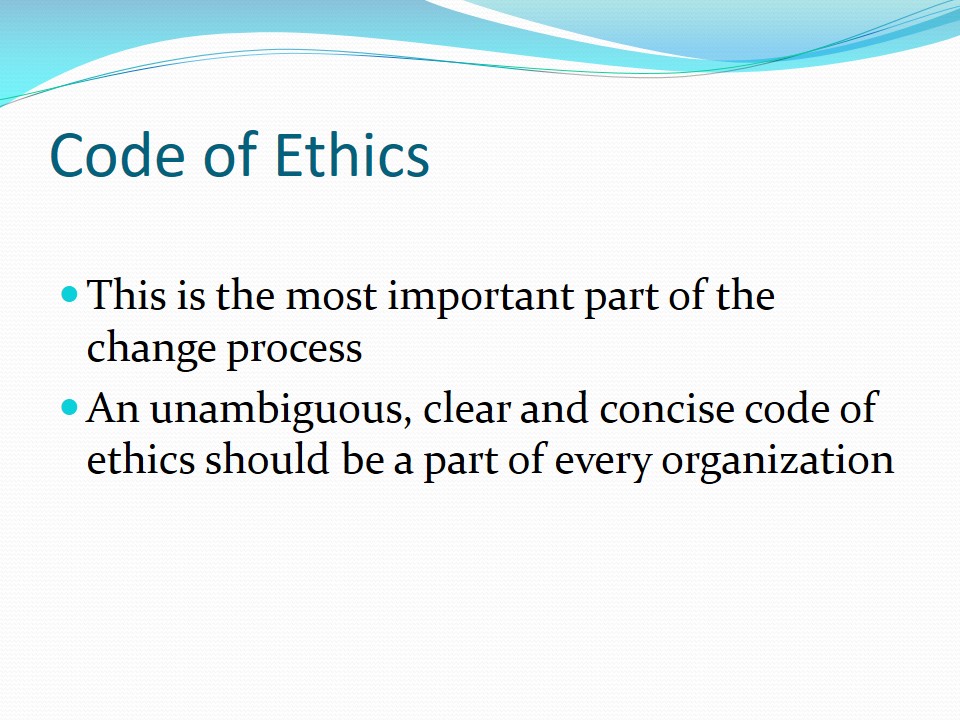
Conclusion
Business ethics does not merely means to follow every rule and regulations present in the code of ethics. It means that the employees and managers should know the different between right and wrong. They should be able to take right decisions without getting influenced from any external factor. Even though the moral development of every person might be different but the top management can work on it and by setting up programs can change the ethical beliefs and values of every employee. Employees should be trained such that they should be able to take the right decisions on their own accord.
Top management sets standards and is a role model for each and every employee. They are the ones who can change the unethical world of business. Even though people today are more concerned about the ethical decisions made by a company, but it has also been noticed that the unethical acts are becoming a norm of the corporate world.
References
Barnett, John. H & Karson, Martin J. (n.d). personal values and business decisions; an exploratory investigation. Journal of business ethics. P371-382.
Dumaine, Brian (n.d) exporting jobs and ethics. Fortune magazine p10.
Ferell, O.C & Fraedrich, John (1994). Business ethics. Boston: Houghton-Mifflin. P.31.
Frederick, William & Weber, James (1990). The value of corporate managers and their critics, an empirical description and normative implications. Business Ethics; research issues and empirical studies. Greenwich CT: JAI press. P 123-144.
Fritzsche, David. J & Becker, Helmut (n.d). Linking management behavior to ethical philosophy- An empirical investigation. Academy of management journal. P 166-175.
Kohlberg, Lawrence (a) (n.d). Essays in moral development: the philosophy of moral development, vol 2. New York, Harper and Row.
Kohlberg, Lawrence (b) (n.d). Essays in moral development: the philosophy of moral development, vol 1. New York, Harper and Row.
Malachowski, Alan. R. (2001). Business Ethics: Critical Perspectives on Business and Management. Routledge (June 2001).
Posnor, Barry .Z & Schmidt, William (n.d). Values and American manager; an update. California management review.p202-16.
Tetzeli, Rick (1991). Business students cheat most. Fortune magazine. July. P14.